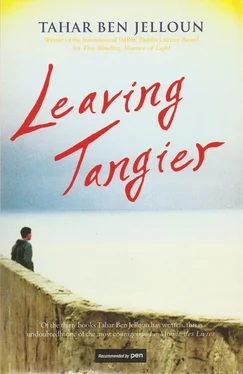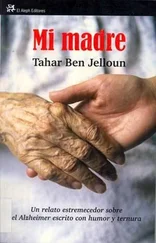Tahar Ben Jelloun - Leaving Tangier
Здесь есть возможность читать онлайн «Tahar Ben Jelloun - Leaving Tangier» весь текст электронной книги совершенно бесплатно (целиком полную версию без сокращений). В некоторых случаях можно слушать аудио, скачать через торрент в формате fb2 и присутствует краткое содержание. Год выпуска: 2009, Издательство: Arcadia Books, Жанр: Современная проза, на английском языке. Описание произведения, (предисловие) а так же отзывы посетителей доступны на портале библиотеки ЛибКат.
- Название:Leaving Tangier
- Автор:
- Издательство:Arcadia Books
- Жанр:
- Год:2009
- ISBN:нет данных
- Рейтинг книги:5 / 5. Голосов: 1
-
Избранное:Добавить в избранное
- Отзывы:
-
Ваша оценка:
- 100
- 1
- 2
- 3
- 4
- 5
Leaving Tangier: краткое содержание, описание и аннотация
Предлагаем к чтению аннотацию, описание, краткое содержание или предисловие (зависит от того, что написал сам автор книги «Leaving Tangier»). Если вы не нашли необходимую информацию о книге — напишите в комментариях, мы постараемся отыскать её.
Leaving Tangier — читать онлайн бесплатно полную книгу (весь текст) целиком
Ниже представлен текст книги, разбитый по страницам. Система сохранения места последней прочитанной страницы, позволяет с удобством читать онлайн бесплатно книгу «Leaving Tangier», без необходимости каждый раз заново искать на чём Вы остановились. Поставьте закладку, и сможете в любой момент перейти на страницу, на которой закончили чтение.
Интервал:
Закладка:
Azel had been growing increasingly lost, shutting himself up in an imaginary world, believing in fate and premonitory dreams, being guided by what he called ‘the fragrance of the perfume of death.’ He had become a true professional liar, an actor who knew how to turn the most hopeless situation to his advantage. He counted on his long eyelashes and his dark, laughing eyes. His mother had always told him that he was the handsomest boy in Tangier; he was finally taking her at her word, and acting accordingly.
Azel lit a cigarette. Setting out for Barcelona’s main drag, Las Ramblas, he knew that he was leaving the residential neighbourhood of Eixample forever. The sky was flooded with sublime light, but Azel’s heart was bruised, in the grip of an alien hand. He had tears in his eyes and his mouth was dry, with a bitter taste. He told himself it was because of the cigarette, and the lousy wine he’d drunk the night before. He walked along, head down. No desire to talk, to think. And yet he loved Passeig de Gracia, that wide avenue along which you could walk forever. This morning, however, nothing was as usual, and the people he passed looked like shadows, transparent bodies auguring some imminent misfortune. He felt as if he were running full tilt down a dangerous hill. Now and then he would stop for a moment and lean back against a tree. All of a sudden, the sounds of the city were coming to him amplified, clanging in his head with the force of a nightmare.
At the end of Las Ramblas begins the Barrio Gótico, the medieval labyrinth at the centre of old Barcelona; there Azel recognized a few faces, Moroccans, small-time dealers or young layabouts who spent their days wandering the streets in search of fresh schemes or adventures. Azel didn’t want to chat with them this morning; he even felt disconnected from their language, their ways, their world. He pitied them. He stepped up his pace to avoid any chance someone would approach him with something to sell or exchange for a bit of kif.
He drank some coffee without sugar, spat on the ground, and cursed the day he’d first set foot in this country. A feral cat dashed across the street. Azel envied its freedom.
Dirty, unshaven, with dark circles under his eyes, Azel rang Kenza’s doorbell. She’d been sleeping soundly, to rest up after her nights on duty, and refused to let him in, asking him to come back later. He began pounding on the door. Nâzim, who’d spent the night there, got up to put a stop to that racket. When he opened the door, he caught a punch on the chin.
‘What’s he doing here, this kike? Unless he’s one of those khoroto s, those Third World guys who prey on respectable girls…’
Wearing hardly anything at all, Kenza asked Nâzim to move out of the way: this business did not concern him. Then she screamed out her anger at Azel.
‘He’s not a kike or a khoroto either! This man has a first name, a family name, a country, and a job — imagine that!’
‘Oh really? Then why didn’t you tell me anything about him? Where’s he come from?’
‘His name’s Nâzim, he’s Turkish.’
‘That’s just what I said, he’s a khoroto! ’
‘Don’t use language like that with me. I forbid you! You’re such a disappointment, Azel, nothing works with you, you ruin everything.’
‘Fine, but I won’t put up with him touching you.’
‘Who do you think you are, to put up or not with anything ? I don’t care what you think! Just look at yourself! You’re a complete mess!’
‘I don’t like Turks. I don’t like their language, I don’t like their loukoum candy, I don’t like the way they look at people.’
‘You’re a racist!’
‘So what? I have the right not to like Turks, or Greeks either… Men, those who touch you, anyway — I can’t bear it that you belong to them…’
‘Maybe you’d like to add Arabs, Jews, and Africans to the list?’
‘Arabs? I could never stand them. I’m an Arab who doesn’t like himself. There. At least things are clear. All right, fine, I’m out of here: you’re going bad, you’re turning into a whore, and you’re hurting our mother.’
‘That’s it, drag in our mother! I can think of one mother who’d be crushed if she could see what’s become of her beloved son.’
‘It’s all your fault! We could have stayed together, like the fingers of a single hand, but you, you worked up this scheme to leave the country and our family and now you’re going to the dogs! A Turk fucking my sister — how do you expect me to stand that!’
Azel slammed the door and ran off. He was crying. He stopped at a bar and downed shot after shot of whisky. Once he was drunk, he took a taxi back to Miguel’s house.
He vomited on the carpet in the front hall. Carmen put his suitcase out on the sidewalk and ordered him never to come back. The shock restored a sudden lucidity to Azel, who saw the situation with clarity and precision. He knew it was the end. He realized that this was the last time he would ever cross that threshold. Then he felt something like a great relief: he was free at last to go smoke kif, drink cheap wine, hang out in the streets, and see his pals again, with whom he shared the same sense of despair. It took him a long while to walk to the Barrio, where his friend Abbas was the local big shot.
‘I’m free, I’m finally free!’ he shouted as soon as he spotted him. ‘I don’t have to fuck some guy to make a decent living!’
26 . Malika
MALIKA DREADED the night. That was when she coughed the most. Sometimes she coughed so much she almost choked, and the struggle to clear phlegm from her lungs brought tears to her eyes. She swallowed spoonfuls of honey; she loved the way it soothed her throat for a moment, but as soon as she lay down again, the cough returned like a nervous tic. Her sister’s husband complained that her coughing fits woke him up. It was her sister who finally took Malika to the Hôpital Kortobi, barely a minute’s walk from the house. If they’d had fifty dirhams to slip to the male nurse, they could have seen the general practitioner sooner, but as it was they had to wait all morning. The doctor was a young man who seemed overwhelmed by his work. Too many patients, not enough resources. Like everyone else, the doctor dreamed of moving downtown to find a better life. Perhaps he would work in a private clinic, or even in a hospital in Oslo, for example. Norway had a shortage of doctors and had recently recruited a few North African Arabs who weren’t afraid of frigid weather. For the moment, though, the doctor had to complete his national health service in this public hospital built more than forty years earlier, right after independence. Everything in it was falling apart: walls, rooms, employees, interns, stray cats and dogs. Only the trees had grown and appeared to be in excellent health.
The doctor had barely taken one look at Malika when he exclaimed, ‘Another victim of those shrimp!’
It was the poor people of the city who came to this hospital, and of course it was their children who worked in the shrimp factory. Malika was sobbing with fear. The doctor promised he wouldn’t hurt her, but it wasn’t the examination that frightened her, it was dying — leaving without realizing her dream, leaving without ever having left the country, leaving to be buried in a hole in the cold, cold ground. Malika was afraid because she had seen in the doctor’s eyes how sick she was, how upset he’d been by her condition, because in spite of his stressful work, this doctor was still a kind person at heart. He was truly angry that he could not help this child. All the same, he sent her for an X-ray, studied it, then phoned another doctor with whom he spoke in quite technical terms. Malika heard the word ‘pneumonia’ repeatedly during the discussion.
Читать дальшеИнтервал:
Закладка:
Похожие книги на «Leaving Tangier»
Представляем Вашему вниманию похожие книги на «Leaving Tangier» списком для выбора. Мы отобрали схожую по названию и смыслу литературу в надежде предоставить читателям больше вариантов отыскать новые, интересные, ещё непрочитанные произведения.
Обсуждение, отзывы о книге «Leaving Tangier» и просто собственные мнения читателей. Оставьте ваши комментарии, напишите, что Вы думаете о произведении, его смысле или главных героях. Укажите что конкретно понравилось, а что нет, и почему Вы так считаете.












